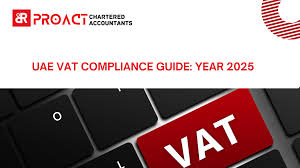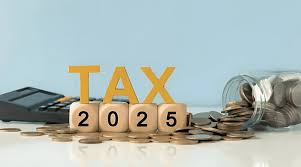Now Reading: Compliance and Reporting Obligations for UAE Property Owners: 2025 Tax Year
-
01
Compliance and Reporting Obligations for UAE Property Owners: 2025 Tax Year
Compliance and Reporting Obligations for UAE Property Owners: 2025 Tax Year

Table of Contents
Introduction

Compliance and Reporting Obligations for UAE Property Owners: The UAE’s real estate market, a cornerstone of its economy, benefits from a tax-friendly environment with no personal income tax or capital gains tax. However, property owners—individuals, businesses, and REITs—must comply with corporate tax, VAT, and other regulatory requirements enforced by the Federal Tax Authority (FTA). With the 2025 tax year introducing updates like the Domestic Minimum Top-Up Tax (DMTT) and proposed eInvoicing, property owners need to stay proactive to avoid penalties and optimize tax efficiency. This guide details the compliance and reporting obligations for UAE property owners in 2025, covering registration, filing, record-keeping, and strategic actions.
Key Compliance and Reporting Obligations
1. Corporate Tax Obligations
- Applicability:
- Individuals: Individual property owners are generally exempt from corporate tax unless they operate a licensed business activity (e.g., leasing commercial properties as a sole proprietor) with annual revenue exceeding AED 1 million ($272,000). Taxable income above AED 375,000 ($102,000) is taxed at 9%; below this threshold, it’s 0%.
- Businesses: Companies owning or managing properties (e.g., developers, REITs) are subject to 9% corporate tax on profits above AED 375,000, unless exempt as Qualifying Free Zone Persons (QFZPs) or Qualifying Investment Funds (e.g., REITs meeting FTA criteria).
- Domestic Minimum Top-Up Tax (DMTT): Effective January 1, 2025, multinational enterprises (MNEs) with global revenues over €750 million (AED 3 billion) face a 15% minimum tax on UAE profits under OECD Pillar Two, affecting large property conglomerates or REITs.
- Registration:
- Mandatory for individuals with business revenue above AED 1 million or businesses with taxable profits above AED 375,000.
- Deadline: March 31, 2025, for those meeting thresholds in 2024, or within three months of meeting the threshold for new businesses.
- Process: Register via the FTA’s EmaraTax portal with Emirates ID (individuals) or commercial license (businesses).
- Penalty: AED 10,000 ($2,720) for late registration.
- Filing Requirements:
- File corporate tax returns within nine months of the fiscal year-end (e.g., September 30, 2025, for a December 31, 2024, year-end).
- Submit audited financial statements in IFRS format for businesses, including rental income, expenses, and deductions.
- REITs seeking exemption must file documentation proving compliance with FTA criteria (e.g., AED 100 million asset value, regulated status).
- Implication: Property owners operating as businesses or earning significant commercial rental income must register and file returns, while individuals with residential properties or low revenue are typically exempt.
2. Value-Added Tax (VAT) Obligations

- Applicability:
- Residential Properties: First sales of new residential properties (within three years of completion) are zero-rated (0% VAT), allowing input VAT recovery. Subsequent sales and leases are exempt.
- Commercial Properties: Sales and leases of commercial properties (e.g., offices, retail, warehouses) are subject to 5% VAT. Property owners with taxable supplies exceeding AED 375,000 ($102,000) annually must register for VAT.
- Services: Real estate-related services (e.g., brokerage, maintenance, legal fees) incur 5% VAT.
- Registration:
- Mandatory for property owners with taxable supplies (e.g., commercial rental income) above AED 375,000.
- Voluntary registration allowed for supplies above AED 187,500 ($51,000) to recover input VAT.
- Non-residents earning UAE-sourced taxable income (e.g., commercial rents) must register unless the reverse charge mechanism applies (VAT liability shifts to the UAE-based tenant).
- Process: Register via the EmaraTax portal with trade license, financial records, and proof of taxable supplies.
- Filing and Compliance:
- File quarterly VAT returns within 28 days of the tax period’s end (e.g., April 28, 2025, for Q1 2025).
- Issue VAT-compliant invoices for taxable transactions (e.g., commercial leases).
- Maintain records for five years, including invoices, receipts, and input VAT claims.
- Penalty: Up to AED 50,000 or 300% of tax due for late filing or non-compliance.
- Input VAT Recovery:
- Recover input VAT on expenses (e.g., construction, maintenance) related to taxable supplies. For mixed-use properties, apportion input VAT based on taxable vs. exempt supplies.
- Implication: Commercial property owners must register for VAT if thresholds are met, ensuring accurate invoicing and timely filings to avoid penalties while maximizing input VAT recovery.
3. eInvoicing (Proposed)
- Description: A proposed eInvoicing system, with public consultation open until February 27, 2025, aims to mandate digital transaction reporting for real-time tax compliance, particularly for commercial property transactions.
- Requirements:
- Property owners issuing invoices for taxable supplies (e.g., commercial leases) must adopt eInvoicing systems compliant with FTA standards.
- Upgrade accounting software (e.g., QuickBooks, Xero) to support digital invoicing and integration with the FTA’s systems.
- Implication: Property owners must prepare for potential mandatory eInvoicing by 2025–2026, investing in technology to ensure compliance and avoid disruptions.
4. Ultimate Beneficial Owner (UBO) Disclosure
- Requirement: Property owners operating as businesses (e.g., LLCs, Free Zone entities) must regularly update UBO information with the FTA or relevant emirate authority (e.g., Dubai Economic Department).
- Details:
- Submit details of individuals owning or controlling 25% or more of the entity.
- Maintain a UBO register and report changes within 30 days.
- Penalty: Fines up to AED 50,000 for non-compliance.
- Implication: Property-owning businesses must ensure accurate UBO reporting to maintain transparency and avoid penalties, especially for Free Zone entities seeking QFZP status.
5. Record-Keeping
- Requirement: Maintain financial records for at least five years, including:
- Invoices, receipts, and contracts for property transactions.
- Rental income and expense records.
- VAT and corporate tax calculations, including input VAT claims.
- IFRS-compliant financial statements for businesses.
- Implication: Robust record-keeping is essential for FTA audits, tax filings, and compliance with OECD Common Reporting Standards (CRS) for non-residents.
6. Free Zone Compliance
- Qualifying Free Zone Persons (QFZPs):
- Property owners operating through Free Zone entities (e.g., DIFC, JAFZA) can benefit from 0% corporate tax on qualifying income (e.g., from overseas or Free Zone activities) if they meet FTA criteria:
- Adequate substance (e.g., physical office, employees).
- Audited financial statements.
- Compliance with transfer pricing rules.
- Non-qualifying income (e.g., mainland UAE commercial rents) is taxed at 9%.
- Property owners operating through Free Zone entities (e.g., DIFC, JAFZA) can benefit from 0% corporate tax on qualifying income (e.g., from overseas or Free Zone activities) if they meet FTA criteria:
- Implication: Free Zone property owners must maintain substance and file documentation to secure tax exemptions, enhancing returns.
7. Tax Residency Certificate (TRC)
- Requirement: Property owners seeking to leverage Double Taxation Agreements (DTAs) with over 140 countries must obtain a TRC to prove UAE tax residency.
- Process:
- Individuals: Provide Emirates ID, passport, proof of 183+ days residence or principal residence/employment with 90+ days presence.
- Businesses: Submit commercial license, articles of association, and proof of management in the UAE.
- Apply via the EmaraTax portal; fees: AED 1,000–5,000 ($272–$1,360).
- Implication: A TRC enables property owners to reduce foreign taxes on UAE-sourced income (e.g., rental income, property gains) under DTAs.
Strategic Actions for Property Owners
- Assess Tax Applicability:
- Determine if corporate tax applies (e.g., business revenue > AED 1 million) or VAT (taxable supplies > AED 375,000).
- Individuals with residential properties or low revenue are typically exempt.
- Register Timely:
- Complete corporate tax registration by March 31, 2025, for 2024 thresholds, and VAT registration for commercial properties exceeding AED 375,000.
- Leverage Free Zones:
- Operate through Free Zones to benefit from 0% corporate tax on qualifying income, ensuring compliance with QFZP requirements.
- Optimize VAT Recovery:
- Register for VAT to recover input tax on commercial property expenses, maintaining accurate apportionment for mixed-use properties.
- Prepare for eInvoicing:
- Invest in accounting software to support digital invoicing, aligning with the proposed eInvoicing system by 2025–2026.
- Maintain Records:
- Use IFRS-compliant systems to track income, expenses, and tax calculations, retaining records for five years to pass FTA audits.
- Secure a TRC:
- Obtain a TRC to leverage DTAs, reducing foreign taxes on UAE property income for non-residents or businesses.
- Engage Tax Advisors:
- Consult professionals (e.g., PwC, CLA Emirates) to navigate corporate tax, VAT, UBO, and DTA compliance.
- Monitor DMTT:
- Large MNEs should assess global tax positions to mitigate the 15% minimum tax impact, leveraging DTA credits.
Comparative Advantage
- Tax-Friendly Environment: No personal income tax or capital gains tax vs. 20–28% capital gains tax in the UK or 15–20% in the US. A $500,000 property gain is tax-free in the UAE.
- Low VAT: 5% VAT on commercial properties vs. 20% UK or 19% Germany, with exemptions for residential properties.
- DTA Network: 140+ DTAs reduce foreign tax liabilities, unlike jurisdictions with fewer treaties (e.g., Singapore’s ~90).
- Compliance Simplicity: Compared to complex tax regimes (e.g., US with federal and state taxes), UAE requirements are streamlined, though eInvoicing may add complexity.
Challenges
- Compliance Burden: VAT, corporate tax, and UBO reporting require robust systems, especially for commercial property owners.
- eInvoicing Transition: Businesses must invest in technology to comply with potential digital invoicing mandates.
- DMTT for MNEs: Large investors face additional tax planning for the 15% minimum tax.
- Home Country Taxes: Non-residents must address foreign tax obligations, mitigated by DTAs and the US Foreign Earned Income Exclusion ($130,000 in 2025).
Conclusion
UAE property owners in 2025 must comply with corporate tax, VAT, UBO disclosure, and proposed eInvoicing requirements, while leveraging the absence of personal income and capital gains taxes. By registering on time, maintaining records, and utilizing Free Zones or DTAs, owners can minimize liabilities and maximize returns. The UAE’s tax-efficient regime and robust real estate market, with 40,000 homes expected in Dubai in 2025, make it a top investment destination. For tailored guidance, visit the FTA’s EmaraTax portal or consult PwC or CLA Emirates .
WATCH MORE:https://www.youtube.com/watch?v=TFeX5cTXxRM
READ MORE: Impact of International Tax Agreements on UAE Property Investments in 2025



















